Why Did My Car Insurance Go Up?
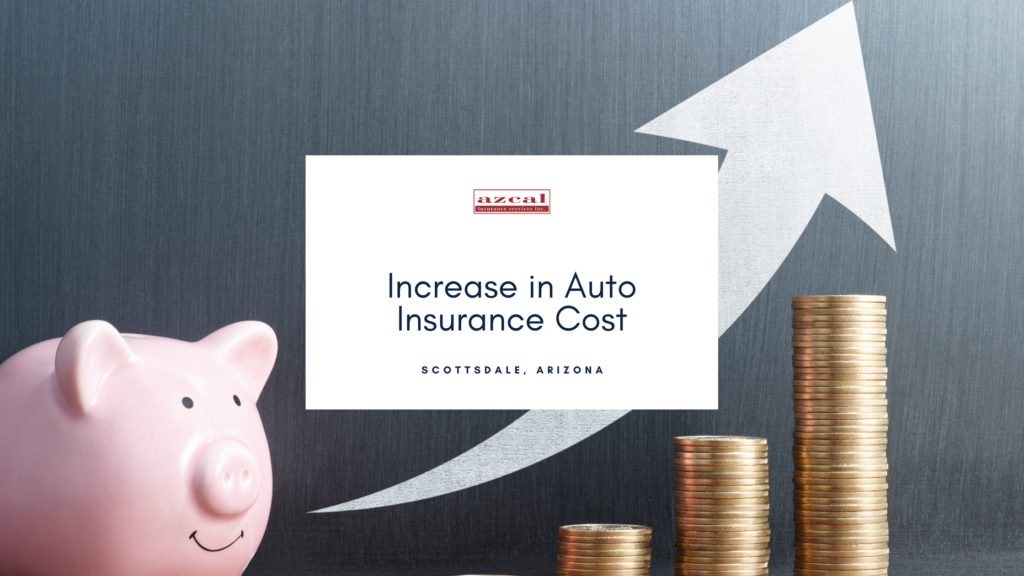
Did you notice an increase in cost for your auto insurance policy? Perhaps you recently received a letter from your insurance company letting you know about future increases to your policy’s premium. In order to understand why your car insurance went up, it’s important to learn about the various factors that impact the cost of auto insurance. Some of these factors we can control, but other factors are beyond our control. It’s helpful to understand the many nuances so that you can make more informed decisions regarding your car insurance needs. If you need any help getting good auto insurance coverage at an affordable price in Arizona, contact AZCAL Insurance Services today. Our team will answer all of your questions and do the hard work to make sure you have the best possible deal.
Does Car Insurance Go Up Every Year?
For many people, the answer to this question is yes. Car insurance often goes up, even if only a slight amount, each time the policy is renewed. This could be every six months or every year. Naturally, the next question you might ask is “why?”. Since there are various factors that impact the cost of car insurance, it’s helpful to break it down into two categories:
- Individual Risk Factors
- Increase in Car Insurance Company’s Expenses
Individual Risk Factors for Car Insurance
Individual risk factors refer to your personal driving record or change in insurance needs (or someone else that is on your auto insurance policy). Examples of individual risk factors include:
- Filed a new claim
- Traffic violation on record
- Add a new vehicle to the policy
- Update the policy to change your vehicle
- Add a new driver to the policy
- Change drivers on the policy
- Age of drivers on the policy
- Increasing the amount of coverage
Technically, you have some control over these factors in that they depend on what you do or don’t do. Of course, with multiple drivers on the policy, you might not be able to control whether or not another driver gets in an accident and files a claim, however they remain your responsibility since they’re on your policy.
With the exception of minor claims (less than $1,000) and minor traffic violations, all of the reasons listed above add more risk in the eyes of the insurance company providing coverage. As a result, the cost of your auto insurance premium is likely to increase if any of these factors come into play.
Increase in Car Insurance Company’s Expenses
There are other reasons the cost of auto insurance might go up for you that have nothing to do with what you do or don’t do. These include:
- Expiring discounts – Some of the discounts you initially received when starting your auto insurance policy might decrease over time and eventually disappear or simply expire after your first policy term. If that happens, then the cost of your insurance will naturally increase.
- Insurance rates change – An insurance company might increase their premiums if they find that their rate levels are too low compared to their expenses from recent claims. If the insurance company is suffering losses because their rates are too low, then they will need to remedy that with an overall increase in auto insurance premiums.
How Much Do Individual Risk Factors Matter?
You might be wondering how much control you have in the cost of your auto insurance and how the insurance companies weigh individual risk factors in their cost-benefit analysis. Insurance companies might vary in their approach to these risk factors, but in general, all insurance companies will re-evaluate policies before renewal. In some cases, they might increase costs due to an increase in risk factors. Other times, they’ll decrease costs due to a decrease in risk factors (such as a clean driving record or removal of a driver from the policy).
No matter what, you should work with a car insurance company that is known for being fair when evaluating individual risk factors and the overall cost of auto insurance.
Contact AZCAL Insurance for Your Auto Insurance Needs
Looking to start or change your auto insurance policy? Make sure you work with an insurance company that you trust. AZCAL Insurance Services, an independent insurance agency based in Scottsdale, AZ, has you covered. Our experienced team will shop around for the best coverage at the most affordable price so you don’t have to. We’ll do the shopping so that you can do the saving. You have nothing to lose and everything to gain. Contact us today to get started!
Home-Based Business Insurance
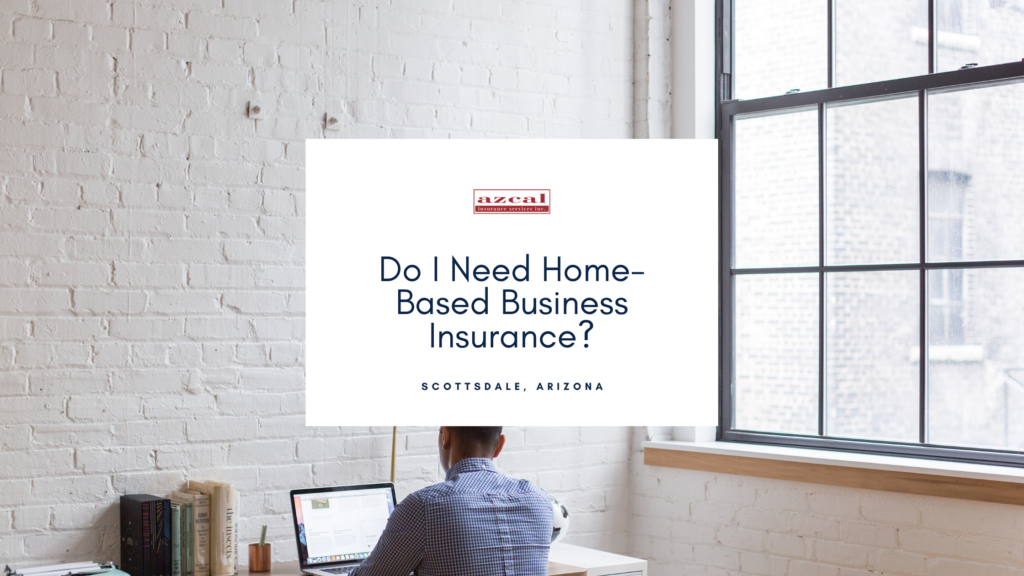
In the same way that auto insurance is essential to protecting your financial interests in the event of an accident or unexpected damages, business insurance allows you to protect your assets and income when it comes to costs associated with property damage, equipment loss, and liability claims. If you are a business owner, you definitely don’t want to pay out-of-pocket for costly damages or legal claims. Such circumstances could be the undoing of your company. No matter what kind of business you own, make sure you have comprehensive coverage that meets your specific needs. If you need help getting started, don’t hesitate to reach out to AZCAL Insurance Services. Our Arizona-based independent insurance agency offers coverage and risk management solutions for companies of all sizes.
Do you own a home-based business? Wondering what business insurance looks like in this situation? Continue reading to learn more!
What is Home Business Insurance?
Getting insurance for a home-based business is different from a standard homeowner’s insurance policy. If you run a business from home, but are depending on your homeowner’s insurance policy to cover matters related to your business, then you have put yourself in a risky situation. While a homeowner’s insurance policy will protect your home, it doesn’t not apply to your business dealings including items such as technology, files, professional equipment, etc. Depending on the nature of your business, going without business insurance coverage might not be worth the risk. Additionally, a homeowner’s insurance policy will not cover legal liabilities related to your business.
In short, getting home business insurance is simply making sure you have a business insurance policy in addition to your standard homeowner’s insurance policy.
What Are the Benefits of Home Business Insurance?
As already mentioned, home business insurance is beneficial because it protects your financial assets in case your home-based business undergoes unexpected damage or you face any type of lawsuit.
Additionally, if you are using your home for a business that your home insurance company doesn’t know about, then you could end up nullifying your homeowner’s personal liability coverage. This unnecessarily puts your home and business at risk. Having separate insurance policies for your home and business ensures you protect both your home and business when the unexpected happens.
How Do I Know If I Need Home-Based Business Insurance?
The size and scope of home-based businesses can range drastically. Someone’s home-based business might consist of freelancing writing services without additional employees. In this case, business insurance probably isn’t necessary. However, another home-based business might manage large stocks of inventory and employee people remotely and/or onsite.
If you are wondering whether or not you need home business insurance, you should ask yourself the following questions:
- Do I use my home to host customers or clients?
- Do I use my home to store inventory and other business-related materials?
- Is my business dependent on my home? In other words, if my home was damaged for some reason, would my business have to be put on hold?
- Do I employ others either remotely or onsite?
- Do I use my computer to manage client or employee records?
If the answer to any of these questions is “yes”, then your homeowner’s insurance policy might not be sufficient to protect your home-based business’s financial interests. You should definitely speak with your insurance provider to determine what type of coverage you need.
In short, you don’t want to be without coverage for your business when it comes to the following circumstances:
- Property damage
- Lawsuits
- Injuries to employees
- Anything related to client/employee data loss
What Kinds of Businesses Need Home Business Insurance?
If you are still wondering if you should get business insurance for your home-based business, then perhaps a few examples will help you determine this. The following types of businesses should probably look into getting business insurance in addition to their homeowner’s insurance policy.
- Web Design Firm – A web design firm run from home will likely depend on expensive business equipment like computers and specialized design software. Additionally, even if the majority of business occurs online and not in-person, a web design firm will probably manage client files and have a furnished home office. In the event that your home undergoes flooding, a power surge, fire, or something else, a business insurance policy will provide coverage for the items related to your business.
- Interior Decorator – If you are an interior decorator that welcomes clients to your home for business purposes, then you should probably get a business insurance policy. This will cover any legal liabilities in case a client is injured and you are held responsible.
- Photographer – Similar to a web design firm, a home-based photographer will likely have a studio with expensive lighting equipment, props, cameras, etc. Additionally, a photographer with a studio will probably host clients for photo shoots. Having a separate business insurance policy will ensure coverage for the equipment and any legal liabilities associated with a client injury onsite.
Contact AZCAL Insurance for Your Business Insurance Needs
If you own a home-based business and you’re not sure what type of insurance you need, contact AZCAL Insurance Services today! We are an independent insurance agency that can offer a customized insurance plan at the most affordable cost. Our team will provide excellent service from start to finish while answering every question you might have. Don’t leave the future of your business up to chance. Make sure you have essential coverage to protect your business’s financial interests.
Extended Dwelling Coverage
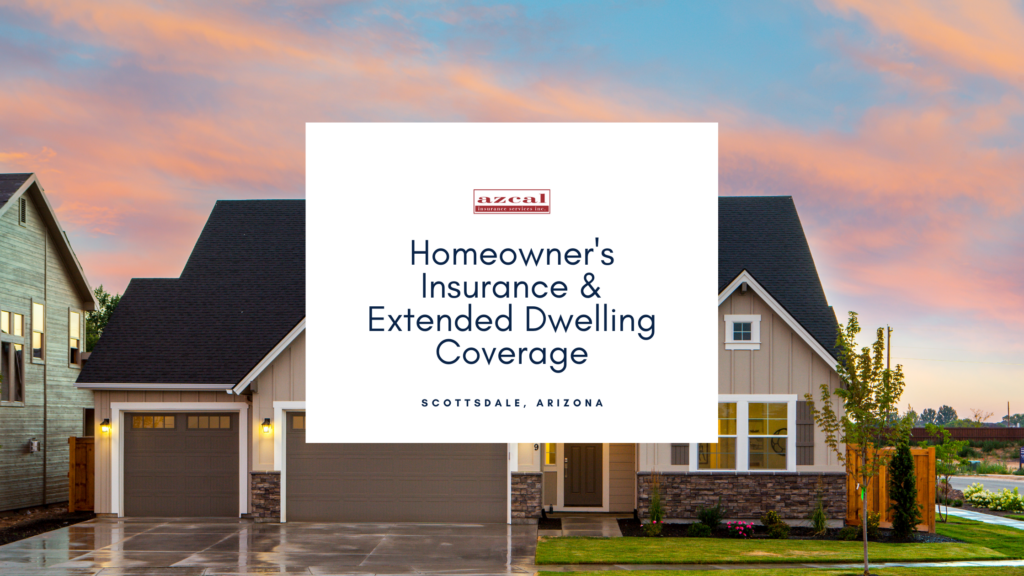
Homeowner’s insurance is a key element to owning a home. Not only is it required to get a mortgage, but it offers valuable protection and security to your finances in the event your home is robbed or damaged from fire, weather, an accident, etc. If you own a home or want to own a home, you should make sure you have a homeowner’s insurance policy that fits your particular needs.
What is Extended Dwelling Coverage?
Not all homeowner’s insurance policies are the same in that they don’t always cover every single situation that might arise. You should speak with an insurance advisor to ensure that you have coverage for all the types of circumstances you want coverage for. Sometimes additional coverages, such as Extended Dwelling Coverage, are helpful if you want to have more comprehensive protection.
Meaning of Extended Dwelling Coverage
A standard homeowner’s insurance policy will have something called “Coverage A” or “Dwelling Coverage”, which provides you financial coverage in case your dwelling receives damages or destruction. However, your Dwelling Coverage will have a limit, and it won’t necessarily take into account the total cost of home replacement in case it is completely destroyed. If the cost to rebuild your home exceeds your insurance policy’s coverage limit, then you are responsible to pay the rest out-of-pocket. The fluctuating market of material costs and labor costs will play a factor.
That’s where Extended Dwelling Coverage comes in. Extended Dwelling Coverage is an add-on to your homeowner’s insurance policy that gives you additional coverage for the replacement of your home even if the costs exceed the Dwelling Coverage policy limits. You can often choose the amount of extended coverage you want for a minor increase in your insurance premium fees.
Why Get Extended Dwelling Coverage?
Extended Dwelling Coverage certainly offers peace of mind regarding one’s future financial stability. While you might think this type of add-on would come at a steep price, it really doesn’t. In most cases, Extended Dwelling Coverage adds less than $100 annually to your premium cost. For many, this small increase in payment upfront is well worth the potential coverage.
Examples Where Extended Dwelling Coverage is Needed
Are you trying to decide if you need Extended Dwelling Coverage? Here are a few factors to consider:
- Where do you live? If you live in an area of the country that is prone to natural disasters (hurricanes, tornadoes, fires, etc.), then you should consider getting Extended Dwelling Coverage.
- What is your financial health? Are you willing or able to cover the out-of-pocket costs to replace your home in case it’s needed? If not, then you should definitely consider Extended Dwelling Coverage.
- How much do you value peace of mind? If the potential of needing to pay thousands of dollars out-of-pocket doesn’t bother you, then you might not need additional coverage. But, if you want peace of mind regarding your financial future, then Extended Dwelling Coverage is a good option.
Contact AZCAL Insurance for Your Homeowner’s Insurance
Are you looking into buying a home or switching your current homeowner’s insurance policy? Make sure you contact AZCAL Insurance Services for all of your homeowner’s insurance needs. Our team guarantees exceptional service every step of the way.
Type of Insurance You Should Get When Buying a New Car
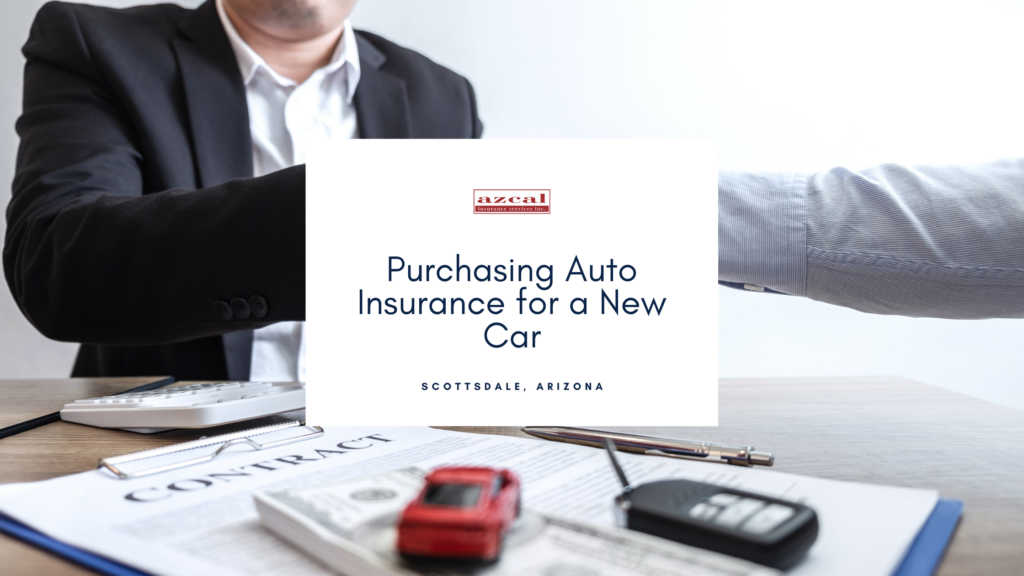
How to Get Insurance for a New Car
You can’t get a new insurance policy before purchasing a new car because you need specific information related to the car to get the insurance. You should to know at least the following three things before getting an auto insurance policy:
-
- Vehicle Identification Number (VIN) – You can’t purchase a car insurance policy without the car’s VIN number.
- Car’s purpose – Depending on how you plan to use the car, whether it’s for personal use or business use, you might need to purchase additional insurance coverage.
- Other regular drivers – If other drivers in your family will use the car on a regular basis, then you will need to add them to your car insurance policy.
While you can’t purchase new car insurance before actually getting a new car, you can start shopping around to collect a few different insurance quotes. That way you can have an idea of what the car insurance will cost you based on the types of cars you are looking at. Once you buy the car, you can call the insurance company with the VIN number and officially purchase the insurance.
Buying car insurance is typically very easy. You can most likely do it on your smartphone while you are at the dealership after you’ve signed the paperwork. If you wait until you get home, one phone call to the insurance provider should get the job done.
Is There a Grace Period When Insuring a New Car?
It’s important to know that the dealership’s car insurance does not cover you once you’ve purchased the car and left the lot. Their insurance is only meant to cover test drives.
However, most insurance companies do offer a grace period for people who purchase a new car. This means that your current auto insurance policy might cover you for a short period of time (likely between 7-30 days depending on the insurance company) after you have purchased a new car. This gives you time to update your auto insurance policy after buying a new car. If you are planning to get a new car, you should remember to do two things:
- Check with your insurance provider about their grace period – If your insurance company does offer a grace period, you should bring whatever is needed to the dealer to prove that you are eligible for this temporary insurance coverage.
- Don’t forget to update your policy – Make sure you update your policy before your grace period ends! Having a lapse in insurance coverage can negatively impact your insurance rates in the future.
Are New Cars More Expensive to Insure?
The answer to this question depends on how you look at it. In general, newer cars are probably more expensive to insure, but it is not always significant. On one hand, you might want to carry comprehensive and collision insurance if you have a newer car, which means a more expensive insurance policy. On the other hand, newer cars often have additional safety features (lane assist, back-up cameras, blind-spot cameras, etc.). These safety features make the car safer to drive, which can mean a lower cost of insurance.
What Type of New Car is the Most Affordable to Insure?
There are various factors that impact insurance costs, but in general, the cars with fewer and less costly insurance claims come with less expensive insurance. For example, since a Honda CR-V 4dr/4WD is more likely to end up with a bodily injury claim than a Ford Expedition 4dr + 4WD, it is likely that the Ford will be cheaper to insure. If you are looking to buy a particular car, it might help to look up the car’s overall accident statistics and safety ratings to have a better idea on potential insurance costs. Again, there are other variables involved, but this is a good place to start.
What Kind of Insurance Do I Need for a New Car?
The type of car insurance you get is dependent on whether your car is financed, leased, or owned. One thing is for certain, you must fulfill your state’s mandatory insurance requirements. The minimum insurance requirements will vary in each state, but most states require liability insurance for bodily injury and property damage. Some states might also require uninsured motorists and personal injury protection.
In addition to your state’s minimum insurance requirements, there might be additional requirements depending on how you purchased your vehicle.
- Financed – If you are going to finance your vehicle, then your lender will probably require you to have comprehensive and collision coverage.
- Leased – If you want to lease your vehicle, then you will likely be required to have comprehensive and collision coverage. Additionally, there could be limits on your deductible (such as not being allowed to have a deductible over $1,000) and requirements for a certain amount of liability coverage (such as $100,000 per person).
- Owned – If you own your car completely, then you should only need the minimum amount of insurance coverage that the state requires. Of course, you can always add comprehensive and collision insurance if it makes sense for your vehicle. This will provide coverage in the event your car is stolen, vandalized, damaged, etc.
What is New-Car Replacement & Gap Insurance?
New-car replacement insurance and gap insurance are both optional coverages you can choose if it makes sense in your situation.
- Gap insurance – This type of insurance is good for vehicles that are loaned or leased. In the event that your car is totaled, gap insurance will cover the difference between the car’s cash value and the amount you still owe on the car. For example, if your car is totaled and its cash value is set at $15,000 but you still owe $17,000 on the car, gap insurance will cover the $2,000 gap that you wouldn’t get with standard collision coverage. This keeps you from “going in the hole” if your car is totaled before it is completely paid off.
- New-car replacement – This type of coverage is not as common, but new-car replacement insurance will pay for the cost of a new car equivalent to the one you totaled. For example, if your car was worth $25,000 when brand new but had depreciated in value to be worth $20,000 before getting totaled, then new-car replacement would give you the $5,000 that the standard collision coverage wouldn’t give you. This allows you to buy a brand new vehicle in the same price range as the one you had before.
Buying a New Car? Contact AZCAL Insurance Services!
Buying a new car is not a small decision, but don’t let the insurance process stress you out. AZCAL Insurance Services is here to help you with every step of the process. Our team guarantees exceptional service. Because we are an independent insurance agency, we can make sure we find the coverage you need at an affordable price. We’ll do the shopping, you’ll do the saving. Don’t hesitate to contact us today to get started!
10 Myths About Car Insurance
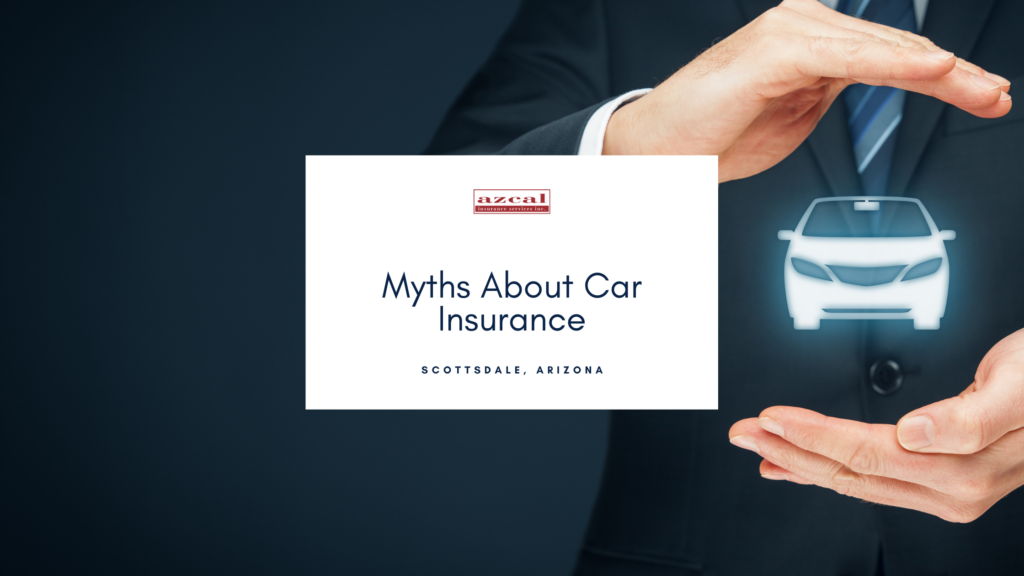
Know What Really Matters When Getting Auto Insurance
Myth #1: The color of your car matters
Many people believe that a red car means you will pay more for your car insurance policy. While insurance companies take several factors into account when determining the cost of auto insurance, the color of the car isn’t one of them. Relevant factors include: car make, model, body type, engine size, age of vehicle, sticker price, cost of potential repairs, safety record, chances of theft, etc.
Myth #2: Auto insurance gets more expensive as you get older
Actually, auto insurance might get less expensive the older someone gets. A couple of reasons include:
- People who are 55+ can take an accident prevention course to get a lower auto insurance rate
- Those who are retired or only work part-time tend to drive less, so they might be able to get a car insurance discount
The programs and discounts available will vary in each state and with each insurance company, so make sure you ask your insurance agent if you are eligible for a lower insurance premium.
Myth #3: Auto insurance is always more expensive for men
If a male and female are the same age and live in the same area, it’s not necessarily true that the male will pay more for auto insurance. There are many other variables an insurance company will consider that will affect the cost of insurance. These include:
- Driving history
- Credit report
- Education
- Vehicle type
- And more!
Myth #4: Your credit history doesn’t matter
Insurance companies might use your credit history to determine how well you manage your finances and therefore how likely you are to file an insurance claim. Generally, people with good credit often pay less for their auto insurance policy.
Myth #5: Auto insurance coverage extends to theft, vandalism, and damage due to the environment
A standard auto insurance policy does not necessarily cover these types of circumstances. To get extended coverage, you should purchase comprehensive and collision coverage as well. It is not always worth the cost of these additional coverages if your car is not worth much, but you will need them if you want full coverage for your vehicle.
Myth #6: The minimum auto insurance for liability required by the law is good enough
If you only have the minimum car insurance coverage that the state requires, you will likely pay significant out-of-pocket costs in the event of an accident. If you have personal financial assets you need to protect, then you should consider a more comprehensive auto insurance policy in the event the other driver files a lawsuit against you.
Myth #7: If someone else drives your car, then their auto insurance policy will cover damages in an accident
While the laws differ in each state regarding this, most states require that the auto insurance policy covering the vehicle is the one that provides coverage in the event of an accident, no matter who the driver is. Make sure you check with your insurance company so you understand the rules in your state.
Myth #8: People in the military pay more for auto insurance
Actually, the opposite is true. Some auto insurance companies provide a discount for those in the military or formerly in the military. Check with your insurance company to see if you and your family qualify for this discount.
Myth #9: Your personal auto insurance policy will cover you when you drive your car for business
If you use your car for business purposes, then you will probably need to have a business auto insurance policy so that you are covered in all circumstances. Additionally, if you have employees that drive your car, you should keep updated on their driving record.
Myth #10: The cost for auto insurance increases if you get a ticket or get in an accident
While multiple traffic tickets can affect your insurance rates, getting a single ticket won’t necessarily make an impact as long as your overall driving record is clean. Additionally, some states have classes that you can take to remove the points that tickets add to your driving record.
When it comes to car accidents, whether or not your premiums increase will depend on the severity of the accident and who is at fault. For example, if you are at fault for an accident and the insurance claim includes the damages for other vehicles and the injuries of other people, then your insurance cost will probably go up. However, if you back-up into a tree or light pole and only cause damage to your own car, it’s possible there won’t be any increase in insurance costs.
Let AZCAL Insurance Help You Get the Car Insurance You Need
There are many opinions and thoughts out there regarding auto insurance policies and the various factors involved in the cost of insurance premiums. Some are true, and some aren’t. Speak with your insurance provider to make sure you understand all of the variables used to determine your insurance costs, and double-check to see if you are eligible for any discounts. Feel free to contact AZCAL Insurance Services if you have any questions! As an independent insurance agency in Arizona, we can help you get the best policy for your needs at the most affordable cost. Learn more today!